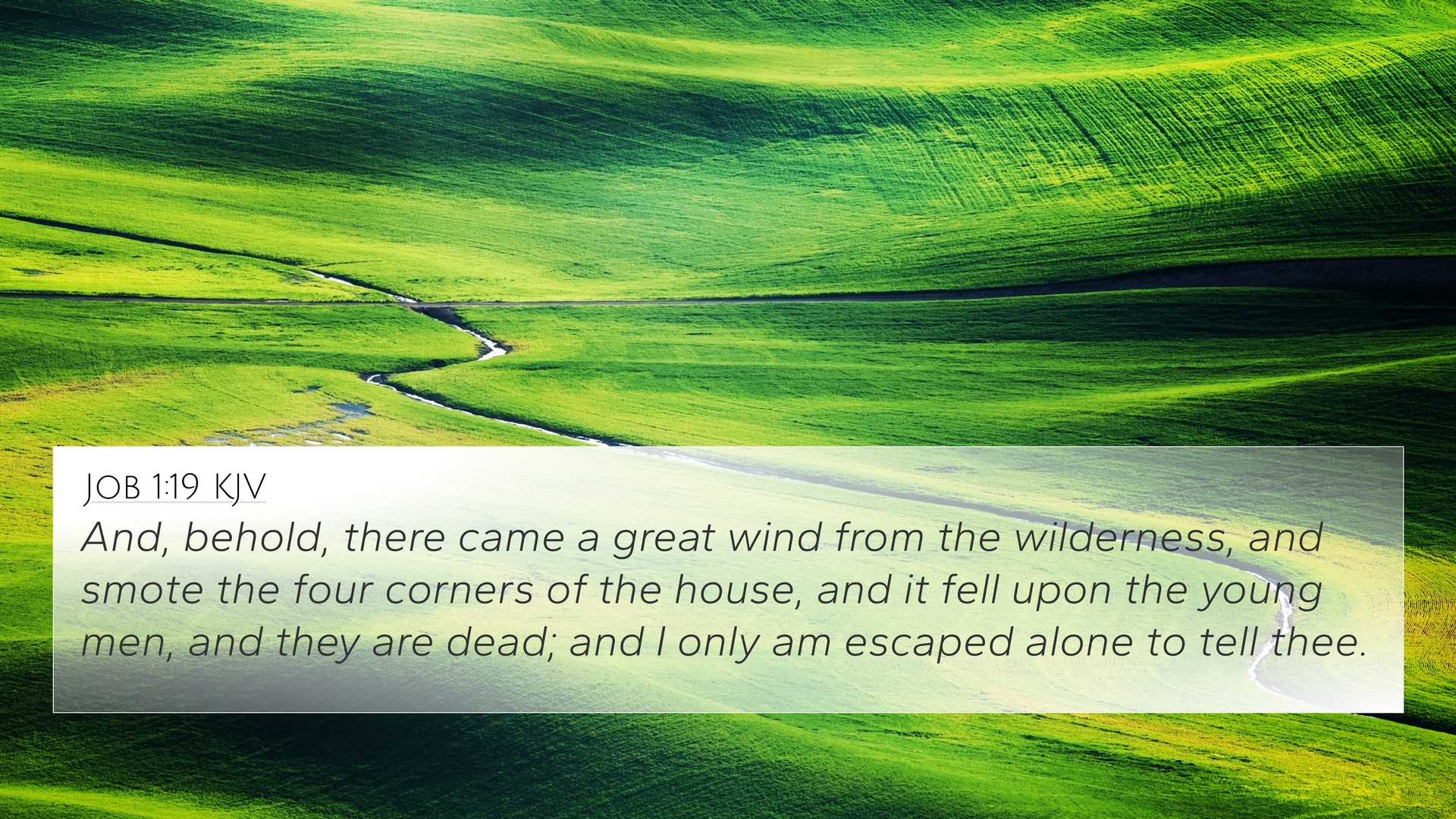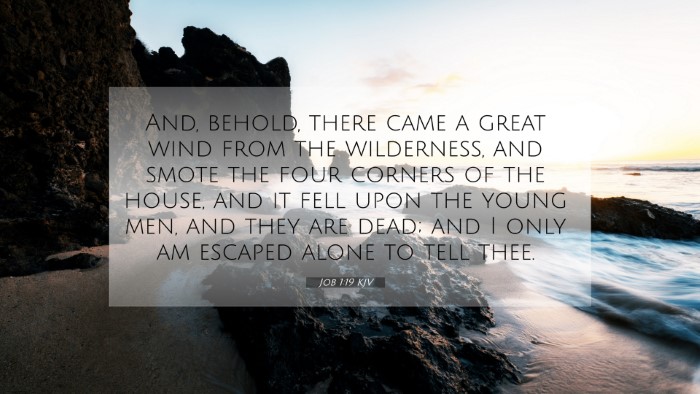Old Testament
Genesis Exodus Leviticus Numbers Deuteronomy Joshua Judges Ruth 1 Samuel 2 Samuel 1 Kings 2 Kings 1 Chronicles 2 Chronicles Ezra Nehemiah Esther Job Psalms Proverbs Ecclesiastes Song of Solomon Isaiah Jeremiah Lamentations Ezekiel Daniel Hosea Joel Amos Obadiah Jonah Micah Nahum Habakkuk Zephaniah Haggai Zechariah MalachiJob 1:19 Similar Verses
Job 1:19 Cross References
And, behold, there came a great wind from the wilderness, and smote the four corners of the house, and it fell upon the young men, and they are dead; and I only am escaped alone to tell thee.
Uncover the Rich Themes and Topics of This Bible Verse
Listed below are the Bible themes associated with Job 1:19. We invite you to explore each theme to gain deeper insights into the Scriptures.
Job 1:19 Cross Reference Verses
This section features a detailed cross-reference designed to enrich your understanding of the Scriptures. Below, you will find carefully selected verses that echo the themes and teachings related to Job 1:19 KJV. Click on any image to explore detailed analyses of related Bible verses and uncover deeper theological insights.
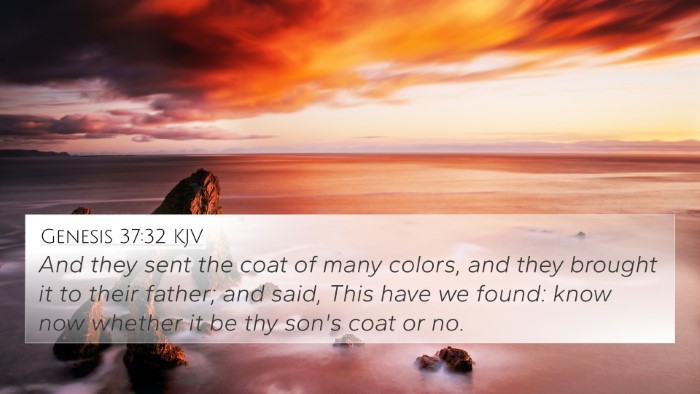
Genesis 37:32 (KJV) »
And they sent the coat of many colors, and they brought it to their father; and said, This have we found: know now whether it be thy son's coat or no.

Acts 28:4 (KJV) »
And when the barbarians saw the venomous beast hang on his hand, they said among themselves, No doubt this man is a murderer, whom, though he hath escaped the sea, yet vengeance suffereth not to live.

Luke 13:1 (KJV) »
There were present at that season some that told him of the Galilaeans, whose blood Pilate had mingled with their sacrifices.

Matthew 7:27 (KJV) »
And the rain descended, and the floods came, and the winds blew, and beat upon that house; and it fell: and great was the fall of it.
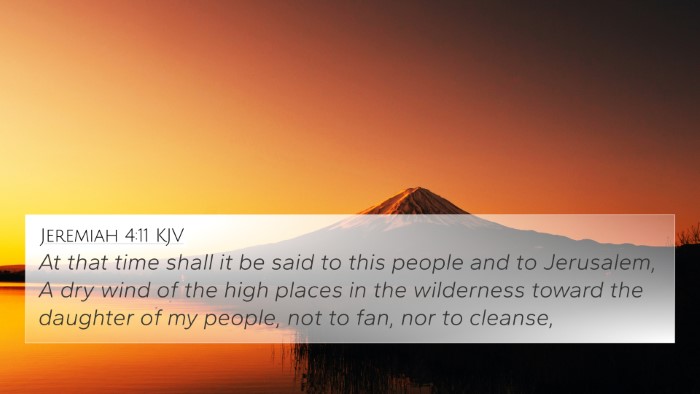
Jeremiah 4:11 (KJV) »
At that time shall it be said to this people and to Jerusalem, A dry wind of the high places in the wilderness toward the daughter of my people, not to fan, nor to cleanse,
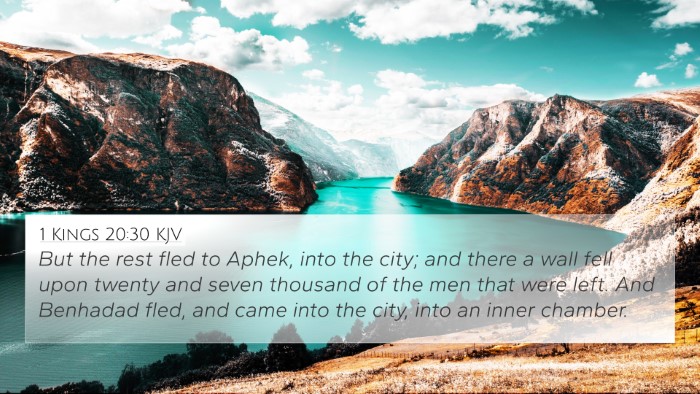
1 Kings 20:30 (KJV) »
But the rest fled to Aphek, into the city; and there a wall fell upon twenty and seven thousand of the men that were left. And Benhadad fled, and came into the city, into an inner chamber.
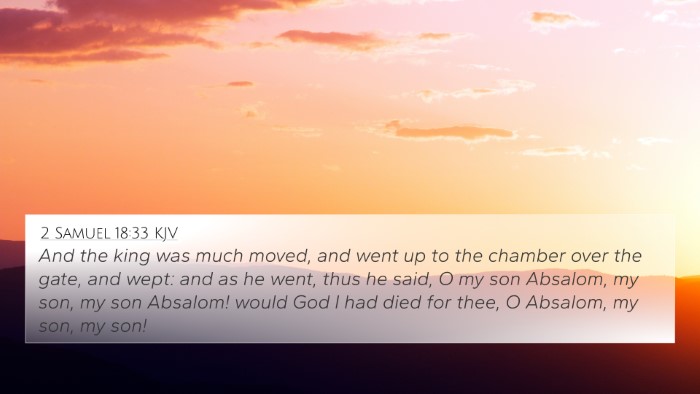
2 Samuel 18:33 (KJV) »
And the king was much moved, and went up to the chamber over the gate, and wept: and as he went, thus he said, O my son Absalom, my son, my son Absalom! would God I had died for thee, O Absalom, my son, my son!
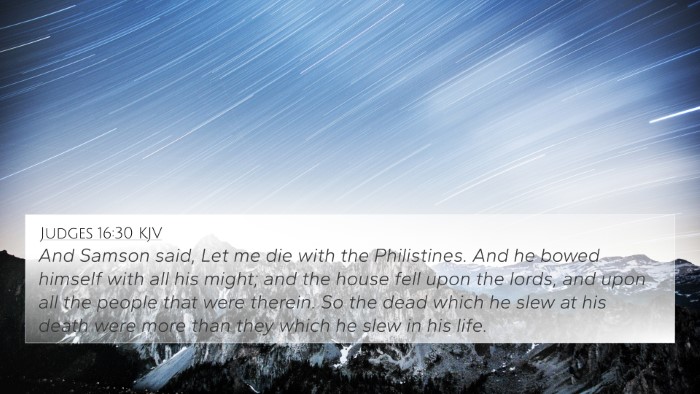
Judges 16:30 (KJV) »
And Samson said, Let me die with the Philistines. And he bowed himself with all his might; and the house fell upon the lords, and upon all the people that were therein. So the dead which he slew at his death were more than they which he slew in his life.

Genesis 42:36 (KJV) »
And Jacob their father said unto them, Me have ye bereaved of my children: Joseph is not, and Simeon is not, and ye will take Benjamin away: all these things are against me.
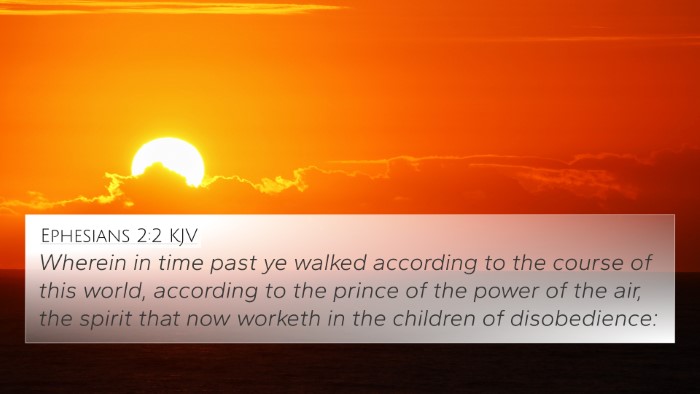
Ephesians 2:2 (KJV) »
Wherein in time past ye walked according to the course of this world, according to the prince of the power of the air, the spirit that now worketh in the children of disobedience:
Job 1:19 Verse Analysis and Similar Verses
Understanding Job 1:19
The verse Job 1:19 states:
"And, behold, there came a great wind from the wilderness, and smote the four corners of the house, and it fell upon the young men, and they are dead; and I only am escaped alone to tell thee."
Summary of Meaning
This verse captures the moment when Job experiences profound loss, marking a pivotal point in the narrative of his trials. The destruction brought by the great wind signifies sudden, uncontrollable devastation that can strike at any moment, illustrating the vulnerabilities of human life and the fragility of earthly possessions and relationships. The messenger’s announcement emphasizes the loneliness of grief and the isolation of suffering, as he is the sole survivor to recount the tragedy.
Commentary Insights
Insights from public domain commentaries enhance our understanding of this verse:
Matthew Henry's Commentary
Matthew Henry emphasizes the arbitrary nature of Job's afflictions. He notes that the winds from the wilderness represent the unexpected and uninvited trials that come upon the righteous. Henry highlights that God permits such calamities to test faith and reliance on divine providence. The verse exemplifies how trials come in overwhelming waves, often leaving the afflicted wondering about their place in God's plan.
Albert Barnes' Commentary
Albert Barnes views this calamity as indicative of the general condition of humanity under suffering. He explains that the four corners of the house may symbolize the completeness of Job’s loss, affecting every aspect of his familial life. Barnes points out the stark contrast between material wealth and spiritual riches, suggesting that the latter remains intact even when the former is destroyed. He encourages readers to find solace in the sovereignty of God amid suffering.
Adam Clarke's Commentary
Adam Clarke focuses on the symbolism of the ‘great wind’ as a metaphor for the trials that test a person's character. He notes that the mention of the 'four corners of the house' illustrates total destruction and a sense of divine judgment. Clarke interprets this event as a reflection of God’s ultimate authority over natural events, suggesting that even in suffering, one can find strength and resilience through faith.
Bible Verse Cross-References
Job 1:19 connects with several other Bible verses that deepen the understanding of suffering, loss, and faith:
- Job 1:21: "Naked came I out of my mother's womb, and naked shall I return thither: the LORD gave, and the LORD hath taken away; blessed be the name of the LORD." – Exploring Job's response to loss.
- Psalm 34:18: "The LORD is nigh unto them that are of a broken heart; and saveth such as be of a contrite spirit." – God’s proximity in times of grief.
- 2 Corinthians 1:4: "Who comforteth us in all our tribulation, that we may be able to comfort them which are in any trouble." – The role of comfort in suffering and sharing that solace with others.
- James 1:2-4: "My brethren, count it all joy when ye fall into divers temptations; Knowing this, that the trying of your faith worketh patience." – The growth found in trials.
- Romans 8:28: "And we know that all things work together for good to them that love God, to them who are the called according to his purpose." – Trust in God’s plan despite adversity.
- Matthew 5:4: "Blessed are they that mourn: for they shall be comforted." – The promise of comfort amidst sorrow.
- 1 Peter 5:10: "But the God of all grace, who hath called us unto his eternal glory by Christ Jesus, after that ye have suffered a while, make you perfect, stablish, strengthen, settle you." – Assurance of restoration after suffering.
Thematic Bible Verse Connections
Job 1:19 can be examined through thematic connections relating to suffering and providence. It resonates with:
- Loss and Grief: Connections found in Psalm 42:11 and Jeremiah 14:17.
- God’s Sovereignty: Reflected in Isaiah 55:8-9 and Proverbs 16:9.
- Faith amidst Trials: Seen in Hebrews 11:1 and 1 Thessalonians 5:16-18.
Tools for Bible Cross-Referencing
Engaging with cross-references helps deepen biblical study. Here are practical tools and methods:
- Bible Concordance: A powerful tool that lists words along with their occurrences to support studies.
- Cross-Reference Bible Study: Engaging in thematic studies that connect various verses.
- Bible Reference Resources: Utilizing software and online tools designed to simplify the cross-referencing process.
- Comprehensive Bible Cross-Reference Materials: Books and guides available that provide extensive cross-referencing information.
User Intent Keywords
People often seek insights on how to find connections between verses, such as:
- What verses are related to Job 1:19: Exploring connections through the lens of suffering.
- How do Job 1:19 and Psalm 34:18 connect: Examining themes of grief and divine comfort.
- Similarities between Job's trials and Jesus' suffering: Analyzing the concepts of enduring adversity for a greater purpose.
Conclusion
Job 1:19 serves as a profound reminder of the trials of life and the steadfastness required to navigate them. The rich insights from various commentaries and cross-references unveil a tapestry of meaning surrounding suffering, loss, and faith. By engaging with the broader biblical context, believers can find hope and strength amidst their own trials.
